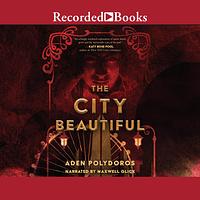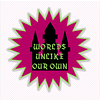You need to sign in or sign up before continuing.
Take a photo of a barcode or cover
dark
mysterious
medium-paced
Plot or Character Driven:
Plot
Strong character development:
Yes
Loveable characters:
Yes
Diverse cast of characters:
No
Flaws of characters a main focus:
No
Find this review and more on my blog at Worlds Unlike Our Own.
Thank you to the publisher, Inkyard Press, and NetGalley for providing me with an eARC of this book in exchange for an honest review.
In the shadow of the 1893 World’s Fair in Chicago, a killer is stalking the streets, targeting young Jewish immigrants. Alter Rosen, who recently immigrated from Romania, struggles to make a living while also trying to save up enough money to bring his family to America. But when his best friend and roommate Yakov is the latest victim of the killer, he gets caught up in a dark plot as Yakov’s dybbuk possesses him and begins to take over him entirely. The only way Alter will get out of this alive is to complete the task for which the dybbuk is lingering and turning to a friend from a past he left behind might be the only way to accomplish it. With each day, the dybbuk threatens to take over, and it’s a race against time for the two boys as they must track down the killer before there are any more murders.
The historical setting of the World’s Fair in Chicago made for a perfect backdrop for this mystery. It was quite interesting to read a book that had a Jewish main character that wasn’t related to WWII, and the author has shed light on the fact that persecution of Jews was not limited to the Holocaust. This is a time period I’m not as familiar with but the way it was all portrayed felt very real, from the exploitation of immigrant workers to some pretty extreme and horrifying anti-Semitism. On the other hand, there was so much about Jewish traditions, customs and faith woven into the story and it was so wonderful to read and learn more about this culture. The glossary at the end of the book with translations of the Yiddish words was so helpful too. This book starts out rather slowly, but by around the 30-40% mark, I was completely hooked and the murder mystery became more intriguing by the page, though it was much darker than I expected. I love how the author depicted the glamorous illusion of the World’s Fair with the reality beneath the surface being quite different and the more fantastical concept of a dybbuk possessing Alter fit right in alongside it all.
The cast of characters was interesting and likeable and I loved following Alter, Frankie and Raizel’s arcs. The story was narrated from Alter’s POV and the character development for both him and Frankie was excellently done, though I would have liked to see more of Raizel’s story as well. Despite the mystery being the core of the book, there is so much else going on that multiple perspectives could have added a lot.
I do feel though, that this book could have been a bit shorter. Some parts of the story definitely felt like it was dragging its heels until the next reveal came along, and there were a lot of unnecessary threads that diverted the attention from the main story to the extent that it takes nearly half the book for the information that we, as readers, know from the synopsis to show up on page and be confirmed.
The ending was a fitting and satisfying conclusion, and while I didn’t spot the clues ahead of time, I think that’s a good sign in this case, because I was so caught up in the story that I barely looked for them. If you decide to read this book, do take a moment to look over the content warnings, because this was much darker than I initially expected given the synopsis. Overall, this was an engrossing read, if a heavier one, and I would definitely recommend it!
Thank you to the publisher, Inkyard Press, and NetGalley for providing me with an eARC of this book in exchange for an honest review.
In the shadow of the 1893 World’s Fair in Chicago, a killer is stalking the streets, targeting young Jewish immigrants. Alter Rosen, who recently immigrated from Romania, struggles to make a living while also trying to save up enough money to bring his family to America. But when his best friend and roommate Yakov is the latest victim of the killer, he gets caught up in a dark plot as Yakov’s dybbuk possesses him and begins to take over him entirely. The only way Alter will get out of this alive is to complete the task for which the dybbuk is lingering and turning to a friend from a past he left behind might be the only way to accomplish it. With each day, the dybbuk threatens to take over, and it’s a race against time for the two boys as they must track down the killer before there are any more murders.
The historical setting of the World’s Fair in Chicago made for a perfect backdrop for this mystery. It was quite interesting to read a book that had a Jewish main character that wasn’t related to WWII, and the author has shed light on the fact that persecution of Jews was not limited to the Holocaust. This is a time period I’m not as familiar with but the way it was all portrayed felt very real, from the exploitation of immigrant workers to some pretty extreme and horrifying anti-Semitism. On the other hand, there was so much about Jewish traditions, customs and faith woven into the story and it was so wonderful to read and learn more about this culture. The glossary at the end of the book with translations of the Yiddish words was so helpful too. This book starts out rather slowly, but by around the 30-40% mark, I was completely hooked and the murder mystery became more intriguing by the page, though it was much darker than I expected. I love how the author depicted the glamorous illusion of the World’s Fair with the reality beneath the surface being quite different and the more fantastical concept of a dybbuk possessing Alter fit right in alongside it all.
The cast of characters was interesting and likeable and I loved following Alter, Frankie and Raizel’s arcs. The story was narrated from Alter’s POV and the character development for both him and Frankie was excellently done, though I would have liked to see more of Raizel’s story as well. Despite the mystery being the core of the book, there is so much else going on that multiple perspectives could have added a lot.
I do feel though, that this book could have been a bit shorter. Some parts of the story definitely felt like it was dragging its heels until the next reveal came along, and there were a lot of unnecessary threads that diverted the attention from the main story to the extent that it takes nearly half the book for the information that we, as readers, know from the synopsis to show up on page and be confirmed.
The ending was a fitting and satisfying conclusion, and while I didn’t spot the clues ahead of time, I think that’s a good sign in this case, because I was so caught up in the story that I barely looked for them. If you decide to read this book, do take a moment to look over the content warnings, because this was much darker than I initially expected given the synopsis. Overall, this was an engrossing read, if a heavier one, and I would definitely recommend it!
adventurous
emotional
mysterious
medium-paced
Plot or Character Driven:
A mix
Strong character development:
Yes
Loveable characters:
Yes
Diverse cast of characters:
Yes
Flaws of characters a main focus:
Yes
adventurous
dark
emotional
mysterious
reflective
sad
tense
medium-paced
Plot or Character Driven:
A mix
Strong character development:
Yes
Loveable characters:
Yes
Diverse cast of characters:
Yes
Flaws of characters a main focus:
Yes
I was pleasantly surprised by how much I enjoyed this book. The unique blend of Jewish mythology, murder mystery, and the 1893 World's Fair is a compelling combination. It's refreshing to read about Jewish characters outside of a World War II setting.
Alter is a well-developed protagonist whose devotion to family and friends is relatable, even if his experiences as a young Jewish immigrant are not. The story's dark undertones are appropriate for the time period and add depth to Alter's struggles.
Overall, I'm glad I picked up this book.
I thought the conclusion part was a bit longer than necessary, but other than that it was a decent read. It's clear the author had done a lot of research about the subject. I really liked Frankie Portnoy (Portnoy means a tailor in Russian). There was quite a bit of Russian, btw, and most of it wasn't translated, which didn't bother me as a Russian speaker, but I kinda wonder what other people thought of that.
While the prose wasn't elegant and the pacing was erratic, ultimately I enjoyed this book. The author did an amazing job of fleshing out a devout Jewish immigrant boy struggling to find his place and secure safe passage to America for his family. Through Alter, the reader witnesses the gritty underbelly of late nineteenth century Chicago juxtaposed against the flashiness of the World Fair. The book really opened my eyes to the long history of oppression Jewish communities have faced for centuries. Alter also struggles with his queer identity, something that clashes with his religious beliefs. In the current body of YA queer literature, this isn't a theme that is always addressed positively. Alter learns that he can be his true self while holding onto his strong faith.
CW: anti-Semitism, racial slurs, child sexual abuse, animal slaughter, murder, blood
CW: anti-Semitism, racial slurs, child sexual abuse, animal slaughter, murder, blood
I am predisposed to appreciate #ownvoices Jewish fantasy, but even within that slowly blossoming genre, this new historical fiction novel about a gay teen haunted by the dybbuk of his murdered best friend should stand out. The immersive details bring to life the World's Fair and the rest of the 1893 Chicago setting, not to mention the Jewish immigrant experience of that time and the culturally-nuanced, complicated understanding of his sexuality and desires that a boy like Alter would have. It's a book born of generational trauma that angrily puts antisemitism on stark display, demanding readers face the pogroms that ravished Europe and the attitudes that kept Jews from full participation in American citizenship, well before the better-known atrocities of the Holocaust. It's also a spooky ghost story, a murder mystery, and a meditation on the inadequacies of language to wholly express queer love.
I'm holding back from a five-star rating mainly just because some of the hallucinatory imagery seemed hard to follow and picture clearly as I listened to the audiobook, but that might be less of an issue for folks with the text in front of them, and I could see myself bumping this up another point on a reread. It's all the more impressive given that author Aden Polydoros reportedly wrote the title as an independent study for his undergraduate degree, a feat that has immediately rocketed his future works to the top of my personal to-read list. Representation matters in literature as both a mirror and a window, and the writer has delivered it powerfully here amid a crackerjack YA plot.
[Content warning for pedophilia, homophobia, self-harm, and gore.]
Like this review?
--Throw me a quick one-time donation here!
https://ko-fi.com/lesserjoke
--Subscribe here to support my writing and weigh in on what I read next!
https://patreon.com/lesserjoke
--Follow along on Goodreads here!
https://www.goodreads.com/user/show/6288479-joe-kessler
--Or click here to browse through all my previous reviews!
https://lesserjoke.home.blog
I'm holding back from a five-star rating mainly just because some of the hallucinatory imagery seemed hard to follow and picture clearly as I listened to the audiobook, but that might be less of an issue for folks with the text in front of them, and I could see myself bumping this up another point on a reread. It's all the more impressive given that author Aden Polydoros reportedly wrote the title as an independent study for his undergraduate degree, a feat that has immediately rocketed his future works to the top of my personal to-read list. Representation matters in literature as both a mirror and a window, and the writer has delivered it powerfully here amid a crackerjack YA plot.
[Content warning for pedophilia, homophobia, self-harm, and gore.]
Like this review?
--Throw me a quick one-time donation here!
https://ko-fi.com/lesserjoke
--Subscribe here to support my writing and weigh in on what I read next!
https://patreon.com/lesserjoke
--Follow along on Goodreads here!
https://www.goodreads.com/user/show/6288479-joe-kessler
--Or click here to browse through all my previous reviews!
https://lesserjoke.home.blog
adventurous
challenging
dark
emotional
hopeful
mysterious
sad
tense
medium-paced
Plot or Character Driven:
A mix
Strong character development:
Complicated
Loveable characters:
Yes
Diverse cast of characters:
Complicated
Flaws of characters a main focus:
No
My feelings were all over the place throughout this book—at times I was thoroughly into it, at other time I found myself rolling my eyes and skim reading. I know I'm not the age demographic for this, and had I been a teenager, I would have likely enjoyed this a lot more. There were still things I found necessary and appreciated as an adult though: the focus on antisemitism, the false promises America lures immigrants in with, questions of faith and how to live one's life while being true to oneself, the power people hold over others and how they abuse it. Basically, everything I loved about When the Angels Left the Old Country only amped up to a hundred. And these things need to be discussed and questioned, especially by young readers. I also think Polydoros successfully interwove Yiddish and Jewish terminology into the narrative so that even if we hadn't had the glossary, keeping track of things wouldn't have been difficult. The way Alter's history was slowly unspooled was another high point, as the mystery behind his father's death and his past with Frankie weren't dumped on readers. For me, this was probably the strongest thing about the writing.
So, what didn't work. Pacing was an issue from the start, as the first few chapters were rushed so that I never managed to feel anything for a character who almost immediately dies. His presence haunted the entire book, and yet aside from anything related directly to his role in the plot, I never really knew him or experienced any emotional response regarding him. Same for most of the characters; I wish Raziel had been fleshed out, as she had potential to steal the show. Frankie was the only exception, because his character work and story were compelling, and he ended up being the high point of the novel. Because I didn't like Alter. We got a lot of good things from him (his struggle with religion and queerness, the guilt he feels for past mistakes), but his personality and thought process and idiotic choices made the book difficult to read at times. The setting was serviceable, although I wanted more of the World's Fair itself and Alter's commentary on it—these were moments that truly shone, especially as he observed the fakeness of the exhibits. The first-person perspective wasn't that successful for me, partly because there were instances that came across as overly dramatic in first-person. At the end, I found myself wondering how this might look were it cut down fifty-plus pages; there were small-level plots that technically tied into the overall story but really felt unnecessary.
So, what didn't work. Pacing was an issue from the start, as the first few chapters were rushed so that I never managed to feel anything for a character who almost immediately dies. His presence haunted the entire book, and yet aside from anything related directly to his role in the plot, I never really knew him or experienced any emotional response regarding him. Same for most of the characters; I wish Raziel had been fleshed out, as she had potential to steal the show. Frankie was the only exception, because his character work and story were compelling, and he ended up being the high point of the novel. Because I didn't like Alter. We got a lot of good things from him (his struggle with religion and queerness, the guilt he feels for past mistakes), but his personality and thought process and idiotic choices made the book difficult to read at times. The setting was serviceable, although I wanted more of the World's Fair itself and Alter's commentary on it—these were moments that truly shone, especially as he observed the fakeness of the exhibits. The first-person perspective wasn't that successful for me, partly because there were instances that came across as overly dramatic in first-person. At the end, I found myself wondering how this might look were it cut down fifty-plus pages; there were small-level plots that technically tied into the overall story but really felt unnecessary.







